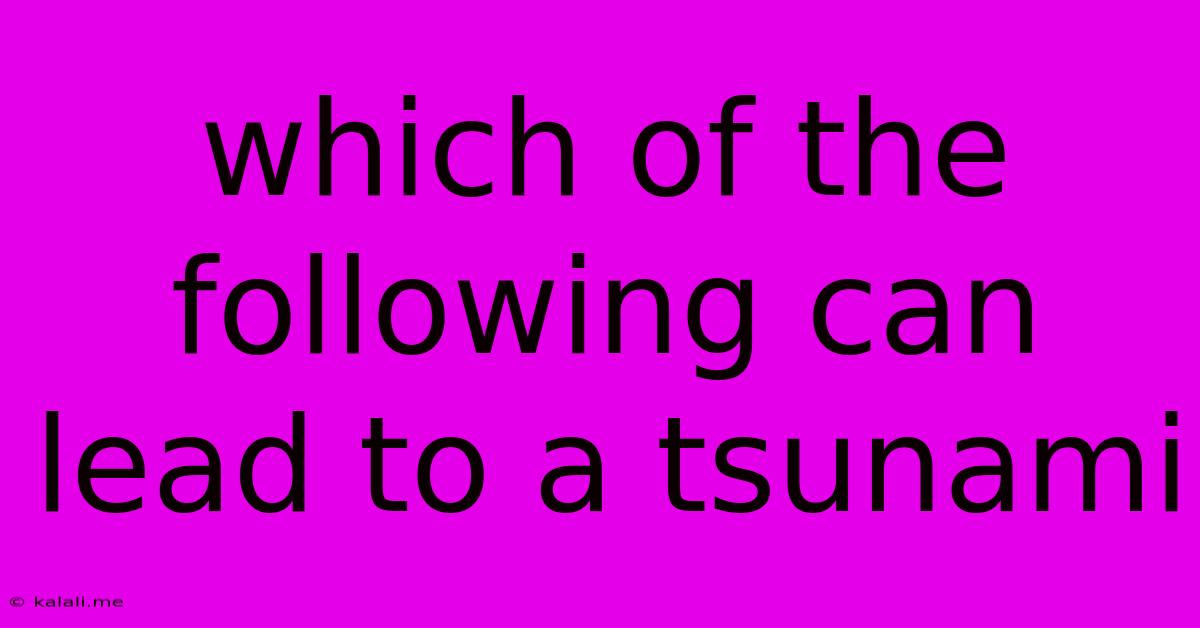Which Of The Following Can Lead To A Tsunami
Kalali
Jun 16, 2025 · 3 min read

Table of Contents
Which of the Following Can Lead to a Tsunami? Understanding the Causes of Devastating Waves
Tsunamis, those devastating walls of water, are a powerful force of nature capable of inflicting catastrophic damage on coastal communities. Understanding their causes is crucial for preparedness and mitigation. This article will explore the various events that can trigger these powerful waves, clarifying which scenarios are truly capable of generating a tsunami.
What is a Tsunami?
Before we delve into the causes, it's important to define what a tsunami actually is. Unlike typical ocean waves generated by wind, tsunamis are a series of waves caused by the rapid displacement of a large volume of water. This displacement can occur across a wide range of underwater or coastal events.
Primary Causes of Tsunamis:
Several events have the potential to generate a tsunami. Let's examine the most significant:
1. Earthquakes:
This is by far the most common cause of tsunamis. Undersea earthquakes, specifically those of magnitude 7.0 or greater and occurring relatively close to the ocean floor, are the primary culprits. The movement of tectonic plates along fault lines displaces vast amounts of water, initiating a series of waves. The depth of the earthquake's focus, the type of fault movement, and the proximity to the coastline all influence the size and impact of the resulting tsunami. Mega-thrust earthquakes, where one tectonic plate slides under another, are particularly effective at generating powerful tsunamis.
2. Volcanic Eruptions:
Certain volcanic eruptions can also trigger tsunamis. This can occur in a few ways:
- Submarine volcanic eruptions: The explosive force of an underwater volcanic eruption can displace a massive volume of water, generating tsunami waves. The collapse of a volcanic flank into the sea can have a similar effect.
- Coastal volcanic eruptions: The collapse of a volcanic cone into the ocean, or a powerful pyroclastic flow entering the water, can displace sufficient water to create a local tsunami.
3. Landslides:
Massive landslides, both underwater and on land, can cause significant water displacement. Underwater landslides, often triggered by earthquakes, are particularly effective at generating tsunamis. Similarly, coastal landslides, particularly large ones occurring near the ocean, can send debris and displaced water surging towards the shore, creating a local tsunami event. The size and speed of the landslide will determine the magnitude of the resulting tsunami.
4. Meteorite Impacts:
While less frequent, the impact of a large meteorite into the ocean could theoretically generate a massive tsunami. The energy released from such an impact would cause a huge displacement of water, resulting in devastating waves. However, this is a relatively rare event in geological history.
5. Ice Calving:
The sudden breaking off and collapse of large sections of ice from glaciers or ice shelves into the ocean can also displace significant amounts of water, potentially creating a localized tsunami. This is most common in regions with active glaciers and ice shelves, like Greenland and Antarctica.
Which Can't Lead to a Tsunami?
It's important to distinguish between events that can cause tsunamis and those that cannot. While large storms and powerful waves can cause significant coastal erosion and flooding, they do not generate tsunamis. High tides, similarly, do not possess the necessary scale of water displacement to create a tsunami.
Conclusion:
Understanding the causes of tsunamis is crucial for building resilient coastal communities. While earthquakes are the most common culprit, volcanic eruptions, landslides, meteorite impacts, and ice calving all pose a potential threat. Awareness of these factors is vital for effective preparedness, early warning systems, and ultimately, saving lives.
Latest Posts
Latest Posts
-
Which Phase Of Mitosis Is Longest
Jun 16, 2025
-
Difference Between Vidhan Sabha And Lok Sabha
Jun 16, 2025
-
The Highest Mountain On The Moon
Jun 16, 2025
-
Relation Between Angular And Linear Acceleration
Jun 16, 2025
-
No Of Diagonals In A Pentagon
Jun 16, 2025
Related Post
Thank you for visiting our website which covers about Which Of The Following Can Lead To A Tsunami . We hope the information provided has been useful to you. Feel free to contact us if you have any questions or need further assistance. See you next time and don't miss to bookmark.